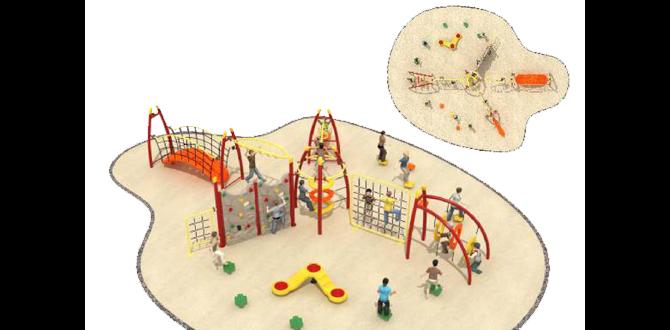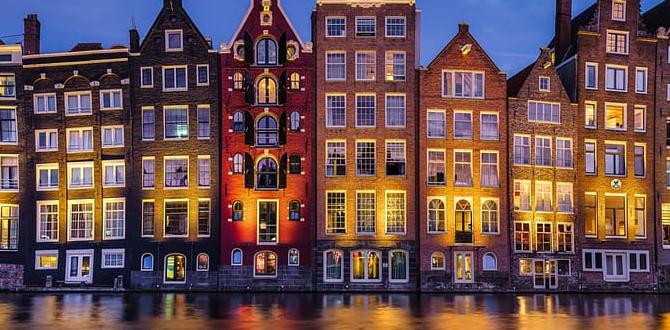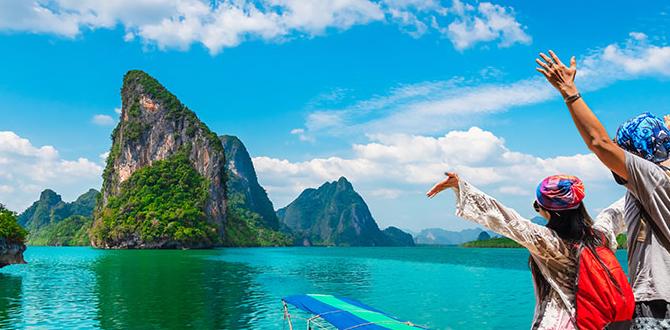Traveling solo as a woman in Algeria is entirely achievable and deeply rewarding with the right preparation. Focus on respecting local customs, staying connected, and embracing the adventure. This guide offers essential tips to ensure a safe, comfortable, and unforgettable experience exploring Algeria on your own.
Planning a solo trip to a destination as rich and captivating as Algeria can feel a bit daunting, especially when you’re a woman venturing out on your own. You might wonder about safety, cultural nuances, or how to navigate independently.
It’s natural to have questions! But with a little insider knowledge and smart planning, your Algerian adventure can be incredibly smooth and incredibly exciting. We’re here to break down everything you need to know, from understanding local etiquette to staying connected on the go. Get ready to feel confident and prepared for an amazing journey!
Exploring Algeria Solo: Your Comprehensive Guide
Algeria, a land of ancient history, breathtaking landscapes, and vibrant culture in North Africa, offers a unique travel experience. For the solo female traveler, it presents an opportunity for deep immersion and genuine connection, provided you approach it with informed awareness and respect. This guide is designed to equip you with the essential knowledge to navigate Algeria with confidence and ease, ensuring your journey is as enriching as it is safe.
Understanding Algeria: Culture & Customs
Algeria is a predominantly Muslim country, and its culture is deeply rooted in traditions that value family, hospitality, and modesty. Understanding and respecting these customs is key to a positive experience for any traveler, especially solo women.
Modesty in Dress: This is perhaps the most significant cultural aspect to be mindful of. While major cities and tourist areas might see slightly more relaxed dress codes, it’s always best to err on the side of caution. Aim for loose-fitting clothing that covers your shoulders and knees. For women, a headscarf (hijab) isn’t strictly mandatory in most everyday situations, but carrying one can be useful for entering religious sites or if you feel it offers an extra layer of comfort and respect in certain environments. It’s about showing respect for the local culture, and you’ll likely find it enhances your interactions with locals.
Greetings and Interactions: Algerians are renowned for their hospitality. A simple “As-salamu alaykum” (peace be upon you) is a polite and appreciated greeting. Handshakes are common between men, and sometimes between men and women if the woman initiates it. Observe local customs; if in doubt, a polite nod and smile are always appropriate. When engaging in conversations, particularly with men, maintaining a friendly but reserved demeanor is advisable. Avoid overly familiar physical contact unless initiated by the other person and you feel comfortable. Remember, your respectful demeanor will likely be met with respectful interactions.
Public Displays of Affection: Keep public displays of affection to an absolute minimum. This includes between couples and generally for anyone. Modesty is highly valued, and such displays can be considered inappropriate.
Photography: Always ask permission before taking photos of people, especially women and children. Some individuals may prefer not to be photographed, and respecting their wishes is paramount.
Alcohol: Alcohol consumption is permitted for non-Muslims in licensed venues, but it’s not widely available in public and is generally frowned upon in more conservative areas. It’s best to be discreet if you choose to consume it.
Safety First: Practical Tips for Solo Female Travelers
Safety is a top priority for any solo traveler. Algeria, like many countries, requires awareness and common sense. By taking sensible precautions, you can significantly enhance your security and peace of mind.
Research Your Destinations: Before you go, research the specific regions you plan to visit. Popular tourist areas like Algiers, Oran, Constantine, and the Sahara Desert are generally well-traversed by tourists. However, be aware of any security advisories. The U.S. Department of State, for example, often provides travel advisories that can offer valuable insights into current risks. Always check your country’s foreign travel advice before departure.
Accommodation Choices: Opt for reputable hotels that are well-located and have good reviews, especially from other solo travelers. Staying in areas with good lighting and security presence can make a difference. Consider guesthouses or riads for a more local feel, but ensure they have solid security measures and positive feedback regarding safety.
Transportation Smarts:
- Taxis: Agree on a fare before starting your journey or ensure the meter is used. It’s often safer to have your hotel or a trusted local arrange a taxi for you, especially at night.
- Public Transport: Buses and trains can be efficient, but be mindful of your belongings and surroundings, particularly in crowded stations or vehicles.
- Ride-Sharing Apps: In larger cities, ride-sharing apps can offer a more secure and transparent way to travel, as driver details and routes are tracked.
Stay Connected:
- Local SIM Card: Purchase a local SIM card upon arrival. This will allow you to use data for navigation, communication, and emergencies at a lower cost than international roaming.
- Share Your Itinerary: Keep a trusted friend or family member back home updated on your whereabouts and travel plans. Check in regularly.
- Emergency Contacts: Save local emergency numbers (police, ambulance) in your phone. The general emergency number in Algeria is 112.
Trust Your Intuition: If a situation or a person makes you feel uncomfortable, trust your gut feeling. It’s always better to remove yourself from a situation than to push it. Don’t be afraid to say “no” politely but firmly.
Daylight Exploration: Whenever possible, explore new areas during daylight hours. This allows you to get a better sense of your surroundings and reduces potential risks after dark.
Navigating Expectations: Dress Code & Appearance
Understanding the local dress code is crucial for respectful and comfortable travel in Algeria. It’s not just about blending in, but about showing respect for the cultural norms of the country you are visiting.
For Women:
- Tops: Opt for blouses or shirts that cover your shoulders and upper arms. Long-sleeved options or three-quarter sleeves are ideal. Avoid low-cut necklines or anything too tight.
- Bottoms: Long skirts, loose-fitting trousers, or capris that reach below the knee are excellent choices. Jeans are generally acceptable in cities, but looser fits are more respectful.
- Outer wear: A lightweight cardigan, scarf, or a light jacket can be useful for covering up when needed or for cooler evenings.
- Head Covering: While not always mandatory, carrying a lightweight scarf is highly recommended. You can use it to cover your head when entering mosques or religious sites, or simply to have an extra layer of modesty in more conservative areas.
What to Avoid:
- Tight or revealing clothing (short skirts, shorts, crop tops, tank tops).
- Sheer fabrics that reveal too much.
- Clothing with offensive graphics or slogans.
Practicality and Comfort: Choose breathable, lightweight fabrics like cotton or linen, especially if you are traveling during warmer months. Comfortable walking shoes are a must, as you’ll likely be doing a lot of exploring on foot.
Embracing the Local Style: You might find that many local women dress very modestly. Following their lead is a good way to ensure you are dressed appropriately and respectfully.
| Scenario | Recommended Attire for Women | Notes |
|---|---|---|
| General City Exploration (Algiers, Oran) | Long loose trousers or maxi skirt, modest blouse with sleeves, comfortable shoes. Optional light scarf. | Most widely accepted and comfortable for sightseeing. |
| Visiting Markets (Souks) | Similar to city exploration, perhaps slightly more conservative with longer sleeves and coverage. | Shows respect for local, often more traditional, environments. |
| Entering Mosques or Religious Sites | Long skirt or trousers, long-sleeved top, and a headscarf covering all hair. Ensure ankles and wrists are also covered. | Essential for entry. Always check specific site rules. |
| Sahara Desert Camps/Tours | Lightweight long trousers, long-sleeved shirts, comfortable closed-toe shoes. A scarf for sun and sand protection. | Practical for the environment, offering sun and dust protection. |
| Fine Dining/Evening Out (in major hotels) | Can be slightly more relaxed, but still modest. A long dress or elegant trousers with a dressy top is suitable. | Hotels catering to international tourists often have a more relaxed ambiance. |
Language and Communication
Arabic and Tamazight (Berber) are the official languages of Algeria. French is also widely spoken, a legacy of the colonial era, particularly in business, education, and among the older generation. English is spoken by some in tourist-related industries, but it’s not widespread.
Key Arabic Phrases: Learning a few basic Arabic phrases can go a long way in breaking the ice and showing respect.
- Hello: As-salamu alaykum (formal) / Marhaba (informal)
- Thank you: Shukran
- Yes: Na’am
- No: La
- Please: Min fadlik
- Excuse me/Sorry: Afwan
- Do you speak English?: Hal tatakallam al-ingiliziyya?
- I don’t understand: La afham
Using Translation Apps: Download an offline translation app like Google Translate before you leave. This can be a lifesaver when you need to communicate more complex ideas or understand signs. Ensure you download the Arabic (and potentially French) language packs for offline use.
Body Language: Be mindful of your body language. A friendly smile and open posture can communicate goodwill even when words fail.
Food and Drink: What to Expect
Algerian cuisine is a delightful fusion of Arab, Berber, Mediterranean, and African influences, offering rich flavors and hearty dishes. Eating well is a crucial part of travel, and here’s what solo travelers should know.
Must-Try Dishes:
- Couscous: The national dish, typically served with vegetables, meat (lamb, chicken, or beef), and a flavorful broth. It’s a staple and often enjoyed on Fridays.
- Tagine: A slow-cooked stew, often made with meat, vegetables, fruits, and spices, cooked in a distinctive conical pot.
- Mechoui: Whole roasted lamb, a celebratory dish often found at special occasions.
- Pastilla: A sweet and savory pie, usually made with pigeon or chicken, almonds, and spices, dusted with cinnamon and sugar.
- Harira: A hearty soup, traditionally made with tomatoes, legumes, and meat, often eaten during Ramadan.
- Breads: Algeria has a variety of delicious breads, from round ‘khobz’ to baguettes.
Where to Eat:
- Local Cafes & Restaurants: These offer authentic flavors and are usually very affordable. They can be a great place to observe local life.
- Hotel Restaurants: Convenient and often offer a variety of cuisines, including international options, which can be reassuring if you’re feeling adventurous with food.
- Street Food: While often delicious, exercise caution with street food if you have a sensitive stomach. Stick to busy stalls where food turnover is high, and ensure it’s cooked thoroughly.
Drinking Water: It is strongly recommended to drink bottled water. Tap water is generally not safe for consumption by tourists. You can buy bottled water easily from shops and hotels. Ensure the seal is intact before drinking.
Alcohol Availability: As mentioned, alcohol is available in some licensed establishments, predominantly in larger hotels and specific restaurants catering to tourists or expatriates. It is not commonly found in local cafes or general restaurants.
Food Allergies/Dietary Needs: If you have specific dietary needs (e.g., vegetarian, gluten-free, allergies), it can be challenging to communicate these effectively. Learning the key phrases in Arabic or French is essential. It might be helpful to carry cards with your dietary restrictions written out. However, be prepared that options may be limited in more traditional settings.
Accommodation Options for Solo Travelers
Choosing the right place to stay can significantly impact your solo travel experience in Algeria. Comfort, security, and location are key.
Hotels:
These range from international chains in major cities to smaller, locally-run establishments. For solo female travelers, sticking to 3-star hotels and above is generally recommended for better facilities, English-speaking staff, and more robust security. Look for hotels in safe, well-lit areas with good reviews regarding safety and cleanliness. Many hotels offer breakfast, which can be a convenient and safe start to your day.
External Link: Consider checking TripAdvisor for reviews and ratings of hotels based on recent traveler experiences.
Guesthouses / Riads:
These offer a more intimate and often charming experience, allowing for closer interaction with your hosts and a glimpse into local architecture and hospitality. They are particularly prevalent in older parts of cities like Algiers or Constantine. Ensure the guesthouse has good security and a solid reputation for welcoming solo travelers. Communication with the owner prior to booking is advisable.
Hostels:
Hostels are less common in Algeria compared to other parts of the world. While they exist in some major cities, they are not as widespread. If you find one, they can be a budget-friendly option and a good way to meet other travelers, but research their safety record thoroughly, especially regarding female-only dorms if available.
Renting Apartments:
Platforms like Airbnb exist, but the availability can be limited, and it’s crucial to vet hosts and listings meticulously. Ensure the apartment is in a safe neighborhood, the building has secure entry, and read all reviews carefully.
Key Considerations for Solo Female Travelers:
- Location: Proximity to attractions, public transport, and safe walking routes is essential.
- Security: Look for hotels with 24-hour reception, well-lit entrances, and reviews mentioning good security.
- Reviews: Pay close attention to reviews from other solo female travelers.
- Staff: Friendly and helpful staff can be a great resource for local information and assistance.
Navigating the Sahara Desert Solo
A trip to Algeria would be incomplete without experiencing the magic of the Sahara. While venturing into the desert solo requires extra planning, it’s an unforgettable adventure.
Guided Tours are Essential: For safety and logistics, it is strongly advised to book a guided tour with a reputable tour operator. This is not an area for independent exploration for solo travelers. Experienced guides are crucial for navigation, managing resources (water, food), and understanding desert conditions.
Choosing a Reputable Operator: Research tour companies thoroughly. Look for operators with excellent reviews, clear safety protocols, and experience catering to solo travelers. Check their credentials and reviews on sites like TripAdvisor or other travel forums. A good operator will be transparent about what’s included in the tour.
External Link: Organizations like the Sahara Desert Tours might offer insights into reputable operators or services, though thoroughly vetting any specific provider is always recommended.
What to Pack for the Desert:
- Clothing: Lightweight, breathable, long-sleeved shirts and trousers to protect from the sun and sand. A light jacket or fleece for surprisingly cold desert nights.
- Head Covering: A large scarf (shemagh or turban) is essential for protecting your face and head from the sun and sand.
- Sun Protection: High SPF sunscreen, sunglasses, and a wide-brimmed hat.
- Footwear: Closed-toe shoes or sturdy sandals that protect your feet.
- Water Bottle: A durable, reusable water bottle. Your tour operator will provide water, but staying hydrated is key.
- Personal Items: Hand sanitizer, wet wipes, lip balm with SPF, any personal medications.
- Power Bank: To keep your phone charged for photos and emergencies.
Staying Safe in the Desert:
- Listen to Your Guide: Your guide’s instructions are paramount. They know the desert and its potential dangers.
- Stay Hydrated: Drink far more water than you think you need.
- Be Aware of Your Surroundings: Even on a tour, maintain an awareness of where you are and your group.





